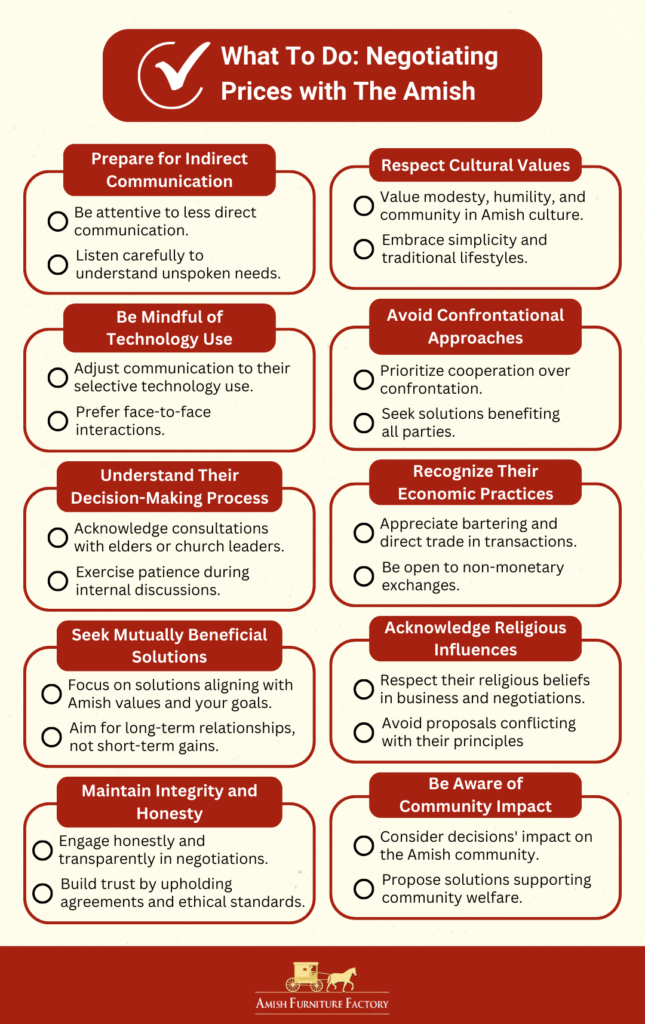
In the heart of Amish communities, where traditional ways meet the modern world, lies a fascinating aspect: their approach to negotiating prices. Unraveling this practice offers a unique glimpse into a blend of old-world values and contemporary economic interactions.
Amish sellers, like those in many cultures, may be open to negotiating prices, particularly in certain contexts such as markets or when dealing with goods that are crafted or produced by hand. However, this can vary widely depending on the individual seller and the nature of the item being sold.
For a closer look at how the Amish community’s values shape their unique approach to negotiations and business and how they balance traditional ways with modern economic demands, read on in our detailed exploration.
The Amish Economy and Modern Practices
The Amish, often perceived as distant from modern economic systems, actually engage in a subtle and adaptive monetary exchange with the broader world. Their approach incorporates traditional values into the fabric of contemporary commerce, creating a unique economic model.
Transition from Agriculture to Diverse Enterprises
Initially rooted in agriculture, the Amish have progressively branched into various business sectors. This shift reflects their pragmatic approach to economic sustainability while adhering to their core values.
Gone are the days when farming was the sole occupation of the Amish. Today, their economic activities range from handcrafted furniture and homemade quilts to running small-scale businesses and food markets.
Selective Use of Technology
The Amish demonstrate a selective yet practical engagement with technology in their businesses. This balance is vital to their success in a modern economy while staying true to their cultural ethos.
Contrary to popular belief, the Amish are not entirely opposed to technology; they use it selectively. Essential technologies that aid their businesses and do not infringe on their lifestyle are often adopted, enabling them to remain competitive and relevant in various markets.
Economic Interaction with the Non-Amish
The Amish have established a unique economic relationship with the non-Amish community. A blend of traditional bartering and modern trading characterizes their interaction with the broader economy.
Amish products, known for their quality and authenticity, have found a significant market among non-Amish consumers. This exchange benefits their community economically and fosters mutual respect and understanding between distinct cultures.
Sustainable Economic Practices

Sustainability and self-reliance are cornerstones of the Amish economic model, reflecting their deeper values and lifestyle choices.
From using locally sourced materials to employing eco-friendly methods in agriculture and production, the Amish model promotes a sustainable and environmentally conscious way of doing business.
This approach aligns with their religious beliefs and appeals to a growing segment of consumers interested in sustainable products.
Negotiation Practices in the Amish Community
The Amish approach to negotiation is deeply rooted in their beliefs, reflecting a preference for peaceful resolution. Understanding these practices provides insights into how they conduct business and resolve conflicts within and outside their community.
Principles of Amish Negotiation
In every negotiation, whether for a business deal or a community issue, the Amish prioritize a peaceful resolution that benefits all parties involved. Their talks are not about winning at the other’s expense but finding a solution that supports community values and respects individual needs.
Conflict Resolution within the Community
Internal conflicts among the Amish are typically resolved through a process involving community elders and focusing on reconciliation.
Disagreements, whether they pertain to business matters or community rules, are often taken to the church leaders for mediation. The Amish value the wisdom and guidance of their elders, believing that such disputes should be settled within the community rather than in external courts.
Engaging with the Outside World
In their dealings with the outside world, the Amish have developed a nuanced approach to negotiation, balancing their traditional values with the complexities of mainstream society.
As highlighted in Wayne F. Miller’s research, the Amish are adept at resolving conflicts through peaceful negotiations rather than confrontational means.
They have successfully navigated discussions with government bodies on social security exemptions, requirements for slow-moving vehicle signs on buggies, and state educational standards.
These negotiations often involve a willingness to compromise, reflecting the Amish’s ability to uphold their principles while engaging constructively with external entities.

This approach is underpinned by their economic influence, media attention, and public sympathy, which, contrary to appearances, provide them with substantial leverage in negotiations.
The Amish’s engagement with the broader society thus showcases their strategic yet respectful negotiation tactics, ensuring their cultural values are harmoniously integrated with the demands of the modern world.
Adaptability in Economic Negotiations
In business transactions, the Amish demonstrate adaptability, balancing their traditional practices with the demands of the modern market.
Their negotiations in trade and commerce are marked by clarity and honesty, focusing on fair pricing and quality. The Amish do not shy away from bargaining but do so to reach a mutually agreeable price.
Amish and Bartering: An Alternative to Negotiation
In the Amish community, bartering is a complementary practice to monetary negotiation. This exchange system plays a significant role in the Amish people’s economic interactions within their community and with outsiders.
The Role of Bartering in Amish Transactions
Bartering is a vital aspect of the Amish way of life, allowing them to uphold their community interdependence values. This practice aligns with their preference for direct, personal transactions.
Instead of traditional cash transactions, the Amish often barter, exchanging goods and services among themselves and non-Amish neighbors.
This trade method allows them to utilize their skills and resources efficiently, fostering a sense of community and cooperation. It’s not uncommon to see the exchange of farm produce for craftsmanship or services, reflecting their self-sufficient lifestyle.
The following table shows the variety of items commonly bartered among the Amish, showcasing the range and richness of their craftsmanship, agriculture, and services.

Building Relationships Through Barter
Bartering among the Amish goes beyond mere economic exchange; it builds and maintains relationships within and beyond their community.
This exchange system is not just transactional but also relational. The Amish strengthen bonds within their community and with their non-Amish neighbors through bartering.
Adapting Barter in Modern Times
Even as the world becomes more monetized, the Amish have found ways to retain bartering as a relevant and effective form of trade.
Despite the predominance of cash-based economies, the Amish community has managed to keep bartering alive and relevant. This practice has adapted to modern needs while adhering to traditional values.
Factors Influencing Willingness to Negotiate
In Amish markets, the willingness to negotiate prices is influenced by a confluence of factors, deeply rooted in both cultural and practical aspects.
Firstly, the nature of the product plays a significant role. Handmade or artisanal items, which have more subjective value and variable costs, often provide more room for negotiation compared to mass-produced goods with fixed prices.
This distinction is particularly evident in items like furniture, quilts, or unique crafts, where craftsmanship and personal effort significantly impact the item’s value.
The seller’s circumstances also shape their flexibility in pricing. Factors such as the cost of production, inventory levels, and seasonal variations can influence a seller’s openness to negotiation.
For instance, a surplus in perishable goods might lead to more flexible pricing, or economic necessity might prompt a seller to adjust prices more readily. Additionally, market conditions, such as local demand or competition, can also play a part.
The dynamics of the buyer-seller relationship is another critical factor. Amish sellers might be more inclined to negotiate with repeat customers or those with whom they have established a rapport.
The culture of the Amish community, emphasizing fairness and integrity, often means that prices are set with careful consideration and reflect a fair valuation of the goods. Consequently, while there is room for negotiation, it might not be as extensive as in more profit-driven markets.
Personal attitudes towards negotiation vary among sellers. Some may naturally prefer a straightforward pricing approach, while others might be more open to haggling. Additionally, the unique qualities of an item, such as rarity or exceptional craftsmanship, can also dictate its pricing flexibility.
Lastly, broader economic trends like inflation or shifts in the cost of living can indirectly impact pricing negotiations. Amish sellers, like others, must adapt to these external economic factors, which can affect their pricing strategies.
Cultural Considerations in Negotiation

The Amish approach to negotiation is deeply influenced by their cultural beliefs, making understanding these aspects crucial for anyone engaging with them. Their negotiation style reflects their broader values and lifestyle, distinct from mainstream practices.
Role of Cultural and Religious Values
Humility, community, and simplicity are at the forefront of every negotiation, whether with fellow Amish or outsiders. The Amish prioritize solutions that maintain community harmony and respect their way of life.
For instance, in business, they seek fair prices that reflect the quality of their work and the effort involved rather than maximizing profit. Their negotiations are infused with honesty, reflecting their deep-seated religious convictions.
Understanding Amish Communication Style
The Amish communication style is characterized by modesty and indirectness, which can be misunderstood by those accustomed to more direct negotiation tactics. Recognizing and adapting to this style is vital in negotiations.
Non-Amish individuals or businesses engaging with the Amish should know their preference for non-confrontational and respectful dialogue.
The Amish tend to express their needs and concerns subduedly, expecting others to understand and respect their viewpoints. Patience and attentiveness are essential in these interactions to ensure mutual understanding and successful outcomes.
Respecting Amish Decision-Making Processes
The decision-making process in the Amish community often involves consultation with community elders or other members, reflecting their collective approach to life. Understanding this process is essential for effective negotiation.
In many cases, especially in matters impacting the community or involving complex decisions, the Amish may take time to consult with their elders or church leaders. This consultation shows respect for their hierarchical social structure and communal values.
For those negotiating with the Amish, respecting this process and allowing time for these consultations can lead to more fruitful and respectful outcomes.
How to Negotiate Prices with the Amish
When entering into negotiations with the Amish, it’s essential to do so with a deep respect for their unique cultural values and lifestyle. The Amish community places great emphasis on modesty, humility, and a strong sense of community, valuing simplicity and a traditional way of life.
These principles should be reflected in your approach to negotiation, demonstrating respect and understanding.
Communication with the Amish often involves more indirect methods. It’s important to be attentive to this subtler form of interaction, listening carefully to understand not just what is said, but also what might be implied or left unsaid. This level of attentiveness can help in discerning their needs and preferences.

A confrontational approach is not well-received in Amish culture. Instead, prioritize cooperation and look for solutions that benefit all parties involved. This cooperative spirit aligns with the Amish focus on community and mutual support.
When it comes to decision-making, be aware that Amish individuals may consult with elders or church leaders, and this process requires patience and understanding. Their decisions are often made with the community’s welfare in mind, and it’s essential to respect this communal aspect of their life.
Technology plays a limited role in Amish life, so adjusting your communication methods is crucial. Face-to-face interactions are often preferred, and it’s important to be mindful of their selective use of technology.
When discussing business, recognize that the Amish may be more accustomed to bartering and direct trade. Being open to non-monetary exchanges can facilitate smoother negotiations and show respect for their economic practices.
The influence of religion is significant in Amish culture, so it’s important to respect their beliefs in all business dealings and avoid any proposals that might conflict with their principles. Aim to find solutions that are mutually beneficial, aligning with both Amish values and your goals. This focus can help foster long-term relationships rather than seeking short-term gains.
In your interactions, always consider how your decisions might impact the Amish community. Propose solutions that support community welfare and show an understanding of their way of life.
Here’s an overview of what you should do when negotiating prices with the Amish:

Comparison with Non-Amish Market Practices
Comparing the negotiation practices in Amish markets with those in non-Amish markets reveals distinct differences rooted in cultural, relational, and business norms.
In many non-Amish markets, especially in Western retail environments, price negotiation is not a common practice for everyday purchases. Prices are typically fixed and non-negotiable, particularly in standardized retail settings like supermarkets, department stores, and most online marketplaces.

Bargaining is generally reserved for larger, more significant transactions such as buying a car, real estate, or at flea markets and antique shops where price fluidity is more accepted.
The transactional nature of non-Amish markets is often impersonal. The interaction between buyer and seller is usually brief and focused on the exchange of goods for money, with little emphasis on building a relationship or understanding the backstory of the product. In contrast, Amish markets often feature a more personal transaction experience.
The buyer may have the opportunity to interact directly with the craftsperson or farmer who produced the item. This personal connection not only fosters a deeper understanding and appreciation of the product but also opens the door for more nuanced negotiation, where the buyer’s appreciation of the item’s value and the seller’s attachment to their craft play a role.
Additionally, in non-Amish markets, the concept of value is often closely tied to branding, marketing, and perceived status, which can dictate pricing strategies and limit flexibility in negotiation. Amish products, however, are typically valued for their craftsmanship, quality, and the labor involved.
The expensive price reflects the material costs and the time invested in creating the product rather than market-driven perceptions of brand value.
Furthermore, in Amish commerce, there’s a strong ethical component to setting prices. Amish sellers are guided by principles of fairness and integrity, setting prices that they believe are just and reasonable for the work involved.
This ethical approach means that while there is room for some negotiation, it is usually within reasonable bounds and not driven by aggressive haggling or profit maximization.
Amish Negotiations: Tradition Meets Modernity
Exploring how the Amish negotiate prices reveals a fascinating intersection of tradition and modern economic savvy. Their approach goes beyond simple price haggling, reflecting a lifestyle deeply rooted in community values and ethical practices.
In every transaction, whether in business or with government, the Amish embody fairness, integrity, and respect for mutual benefit. This insight into their world offers more than just an understanding of their negotiation tactics; it’s a lesson in balancing tradition with practical adaptation in today’s world.
